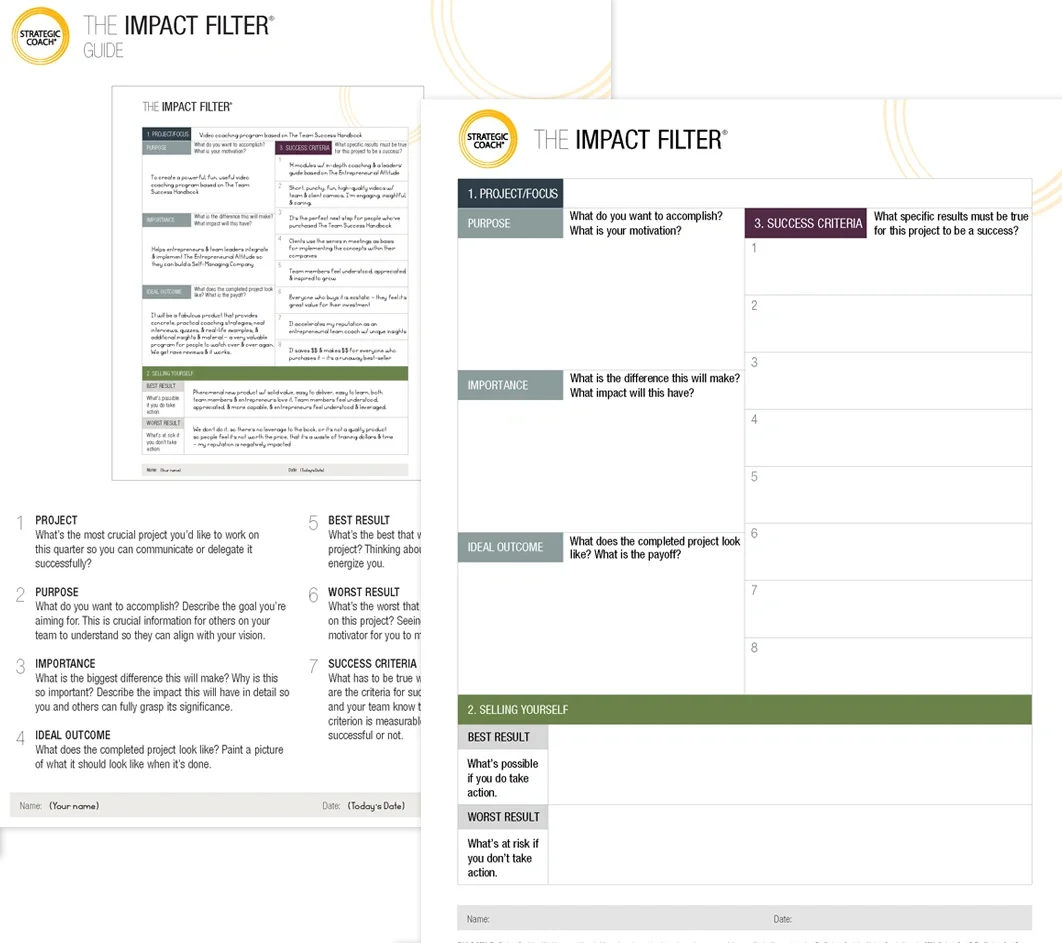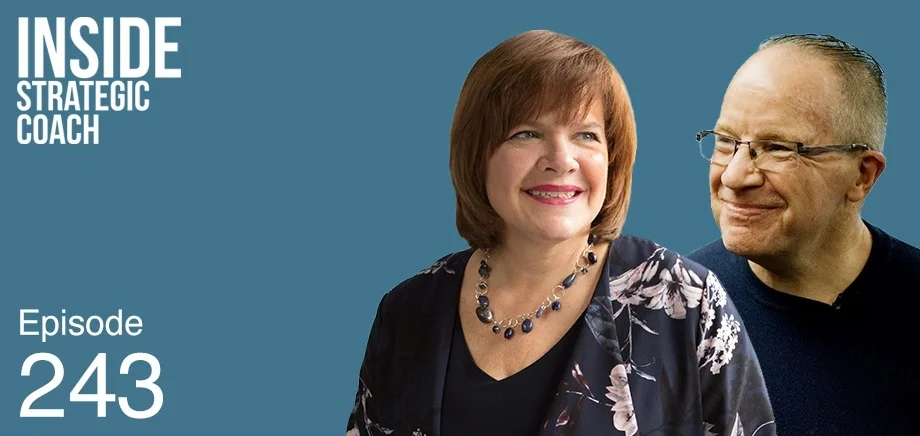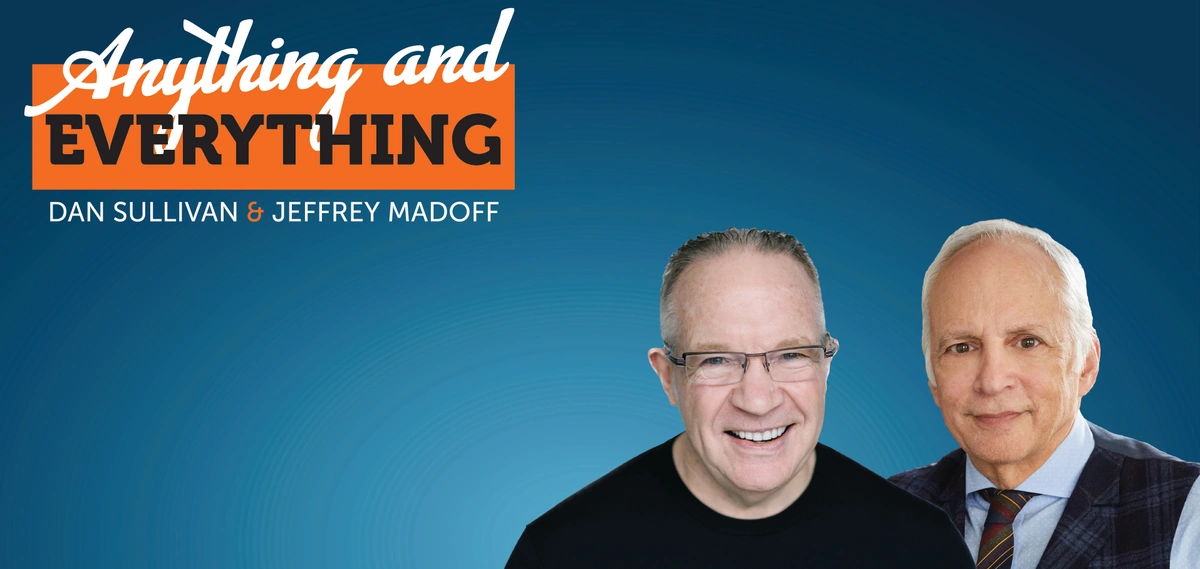Why Ambition Is Often A Dirty Word For Entrepreneurs
October 28, 2025
Hosted By
 Dan Sullivan
Dan Sullivan
 Shannon Waller
Shannon Waller
What if ambition isn’t something you’re born with, but a capability you can keep growing?
In this episode, Dan Sullivan and Shannon Waller explore why ambition is the single master capability for entrepreneurs and how to nurture it. Learn why talking about ambition is difficult, how to grow it continually, and why community and capability are the true accelerators of progress.
Here’s some of what you’ll learn in this episode:
- Why entrepreneurs rely on ambition more than most people.
- The most common misconception about ambition.
- How to navigate the social dynamics around ambition.
- Why envy threatens ambition and how to spot it.
- How Strategic Coach® creates a safe space for honest, open ambition.
Show Notes:
Entrepreneurs succeed because they decide to rely on their own ambition and capability, taking a road most people won’t choose.
Ambition is not a fixed trait—it’s a capability, and it grows each time you acquire new skills or take on new challenges.
Ambition is the single master capability that enables you to achieve all other capabilities.
Openly talking about ambition can be uncomfortable because people often feel there’s a pecking order with ambition, but this discomfort is natural, and moving past it leads to greater freedom and fulfillment.
Comparing yourself to others works against ambition; entrepreneurs thrive by measuring progress from their own efforts and growth, not against external ideals or other people.
Envy is the true enemy of ambition—it’s driven by comparison and leads to stagnation rather than growth.
The Strategic Coach community is designed for entrepreneurs to talk about ambition openly, celebrate wins, and receive genuine support and collaboration.
Unique Ability® is central: focus on a few activities that truly make use of your strengths, and surround yourself with others who do the same.
Collaboration among unique, ambitious people isn’t accidental; when you support someone else’s ambition, you reinforce your own.
Every Strategic Coach tool you master is meant to help you grow ambition, navigate obstacles, and create new opportunities.
If you want ambition to keep expanding, focus on what gives you energy and leverage your team so you can multiply your results.
Growth as an entrepreneur isn’t about fitting in; it’s about continually becoming more useful and unique in the marketplace.
Resources:
Always More Ambitious by Dan Sullivan
The Gap And The Gain by Dan Sullivan with Dr. Benjamin Hardy
Who Not How by Dan Sullivan with Dr. Benjamin Hardy
Episode Transcript
Shannon Waller: Hi, Shannon Waller here, and welcome to Inside Strategic Coach with Dan Sullivan. Dan, we have been talking about ambition for a little bit in the company, and you have been inspired to write some incredible pieces, which the world will be seeing soon. You mentioned this in the workshop the other day, which I thought was really interesting. What you said was, ambition is something that entrepreneurs think about, but can't talk about. And since this is where we talk about everything entrepreneurial, we can talk about it here. So how do you define ambition and why is it something that entrepreneurs think about but don't feel they can talk about?
Dan Sullivan: Yeah, well, I think the most important thing here is that entrepreneurs are entrepreneurs because they're ambitious. And they're unusually ambitious in the sense that it requires a great deal of commitment and courage to actually choose to depend entirely on your own capabilities for your financial future. The big aspect here is that they take sort of a lonely path in life if you consider other people, how their occupations, they're usually joining someone else's organization. Private sector, of course, you have a public sector too, but they're always in an organization.
They're always part of an organization, whereas the entrepreneur is required to create their own organization, you know. And my sense is that most people would not have the ambition to actually do that, but the aspect of ambition as it relates to entrepreneurs is that they think very deeply about this particular topic, but they find it very difficult to talk to other people about because it immediately causes tension because there's an inequality about ambition. People will say, well, he's the ambitious one. If you have a whole group of people, well, who's the really ambitious person there? Which means there's a built-in inequality in the way that people think about it.
And my sense is that this is incorrect. This is an incorrect position about what ambition actually is. And it has to do with how ambition is looked at just generally. And that is that you're born with a certain amount of ambition. I don't believe this is true, but there is a belief that in some mysterious way, some people end up with a lot of ambition, other people not so much, and some people with no ambition whatsoever. It's almost like thinking of ambition as coming in a gas tank. And gas tanks can be very tiny gas tanks, so only a little ambition, or a huge gas tank that has a great deal of ambition. And it's mysterious. Nobody knows why one person seems to have a really big gas tank and the other people don’t.
So we don't like talking about things that make us unequal. We like to talk about things that we have in common and everybody has it. And I think this has always been true. Go back 2,000 years, and I think this was true. Not necessarily gas tanks 2,000 years ago, but a different kind of container. And not only that, but it's only filled up once. It's filled up at birth, but as you go through the decades, you get older, you get into your twenties, thirties, forties, fifties, you're running out of ambition. Okay, and generally that suggests that at certain points you're going to have to retire.
You don't have enough ambition to be successful, to, you know, do your occupation that pays you. This is true for everybody, this incorrect view. And my attitude, and you and I really explored this because we've just completed a book called Always More Ambitious, in which one of the chapters we talk about it is that the correct way for entrepreneurs to understand ambition is that it's a capability and that capability can continually be grown. But not only is it a capability, but it's the single master capability that enables you to achieve all sorts of new capabilities.
And that every time you do that, every time you think of a new thing that you would like to master, a new capability that you didn't have before—I notice it a lot these days because artificial intelligence has come on the scene, and I can see every 90 days checking up on entrepreneurs and Strategic Coach that they've acquired new AI capabilities. And in doing so, they've become more ambitious in what they can do, you know, in their company individually and in their teams and also in their company. So every time you acquire a new capability, it actually increases your ambition. So that's how I look at it.
Shannon Waller: I love it. Dan, you had this up on the screen in the workshop, and I took a picture because I just thought it was so good. You said, ambition is the engine. Ambition is a capability that can continually grow. Ambition is the capability that enables all other capabilities. And you're more ambitious at 50 than you were at 30, and more ambitious at 80 than at 50.
Dan Sullivan: Yeah, can be. If you accept that ambition is a capability, you can be more ambitious at 50 than at 30, and you can be more ambitious at 80 than you are at 50. And I can prove it because I'm 81 and I'm at the height of my ambition. And you've been with me for, you're in your fourth decade now that we've been working together. And I think you would probably say, how's Dan? And he says, well, he's more ambitious than he was when I first met him.
Shannon Waller: Yeah, no probable about it, you definitely are. And one of the ideas for me that is so fascinating is the capability part of it. Because you are more capable, and therefore also more ambitious. And you've had a model for years. It's basically you have ambition, develop the capability, and that inspires the ambition, which inspires new capabilities, which inspires the ambition. I call it leapfrog. And it's so true, because the more capable I get, then I can see, oh, here's the next thing I could do. Here's how I can build on that. And then I become more capable for that ambition, like, oh, now I could do this.
We were just talking about speaking earlier today. It's true. The more capable I get, the more I'm like, oh, then I could do this, and I could do that, and this would be fun. And it just fuels it, which I think is so much more of a useful way of thinking about growth and about capability and about ambition than it's a gas tank that runs out. And it's interesting, I think what gets in the way of ambition is actually what burns people out. It's not the ambition itself, it's the obstacles to it or not pursuing it or being in an environment that doesn't facilitate it. Those are the things that people tire of. What are your thoughts on that?
Dan Sullivan: Yeah, I'm going to bring in the great mathematician-scientist Isaac Newton here, who created the laws of, basically this is physics, you know, we're in the area of physics, and he's got three laws that an object at rest tends to stay at rest unless affected by an outside force, okay? Second one is that an object in motion tends to stay in motion unless affected by an outside force or power. And that for every action, there's an opposite and equal reaction. So that when there is someone who is unusually ambitious, there are forces in the world that try to counteract their ambition.
Yesterday in a workshop, I just drew a box, you know, that's wider than it's high. And I draw a diagonal line. So there's two parts to it. There's a part that starts off really big and gets smaller. And there's the part that starts off small and gets bigger. And I said, I'm going to put the word ambition at the top here. I think you're born with the capability of ambition as a child, which is usually expressed by children just watching the adults around them. And they notice that adults can move around, they can walk. So the child learns how to walk. Adults speak and the child learns it. But it's an amazing amount of ambition that the child has to learn these skills to mimic what they see going on around them. So it kind of tells me that children are born with the, I think, hardwired ability to be ambitious, to actually grow up.
Shannon Waller: Yeah.
Dan Sullivan: Okay. But at a certain point, they start being conscious of their relationship to other people and they start comparing. And once you start comparing yourself to other people, it's actually an opposition to your ambition. It actually opposes your ambition. And I call this a social force. There's a social force, which if you're smart, you begin to realize that if my ambition is going to grow, I have to learn how to negotiate with the social world around me. So in the diagram I showed ambition at the top and at the bottom I showed another word and I surprised everybody.
I said the countervailing force in human affairs that stops people from being more ambitious is envy. Okay, and envy is if you have an envious individual, that envious individual has given up on ambition, and it isn't ambitious, but what really propels them and what really actually influences them, they want other people around them who are ambitious to lose their ambition, to lose the ability to become more capable. So envious people don't want what the other person wants. Envious people want you, if you're the person they're focused on, they want you to stop being ambitious.
They want you not to be more capable because it makes them very uncomfortable. Because they're 100% comparing themselves to outside people. They don't look inward and say, well, I could become more capable. They just want to stop all capability around them.
Shannon Waller: A couple things come to mind, Dan. First of all, being around envious people is soul-destroying because they don't want you to have what you have, and they think they're entitled to it, which is another part. It's just soul-destroying is what I'll stick with. But as you're talking about it and the comparison, that 100% makes me think about our concept of The Gap and the Gain. If comparison is the thief of joy, you know, when you're comparing your insides to other people's outsides, or even against ideals, and you fall short, then you're in the Gap.
It's a measurement issue, as you point out, which I think is brilliant. Instead of looking around and measuring your progress and see where you came from, which is a very personal selection … you're not comparing yourself to other people's past, you're comparing it to your own and your own personal progress. So it's interesting to me that envy is, I can't even say it's a by-product, but it's a function of people being in the Gap. That was a big aha for me.
Dan Sullivan: Yeah. And, you know, I think this has always been true. I mean, we have Bible stories of Adam and Eve had two sons. One was named Abel and the other one was named Cain. You know, Abel was a very ambitious child. I'm presupposing because the story doesn't really fill in the background, but that Cain developed an enormous envy toward Abel and killed him. So the envious person killed the, I'm going to rewrite the Bible here a little bit, but Cain's envy killed his brother. And that was considered just the most horrible possible action that a human being, first of all, could feel, you know, the feeling of envy, with a terrible thing, but then killing is the ultimate bad thing.
Then you have another story in the Bible, Joseph and his brothers, and Joseph was this incredibly capable person and was favored, and he had a coat of many colors, which I indicate that he had a lot of different capabilities. If you read the intent of the story there, and they threw him into a pit, expecting him to die, and as it turned out, he didn't, and he comes back later in life. But the whole thing was the envy on the part of the brothers made them try to kill their brother, also seen as a bad thing.
What's really interesting is that these are two major stories in the Bible. And then, you know, throughout history and courses on philosophy, you know, how people treat each other and everything else, this one trait that when someone seems to be more capable and obviously more ambitious, it can cause enormous anger, resentment, and violence towards another person. So there's this force in the world, and I want to just bring it right back to entrepreneurs now.
But in your opening question, you said entrepreneurs think about ambition a lot, but they find it very difficult to talk about ambition. And what we've discovered in Strategic Coach that if you create an environment that's totally supportive of ambition, it leads to incredible conversations. And it just pours out of them. I mean, I've had three workshops in the last 30 days where we brought up the subject, the three things that you mentioned, this was just on the screen. Ambition is the engine. Ambition is a capability that can be grown. Ambition is the master capability that grows all other capabilities, and that at 50, you can be more ambitious than you were at 30. At 80, you can be more ambitious.
The room just explodes. We want to talk about this. And what I noticed was everybody had great insights about ambition. The conversation, I mean, we had about an hour and a half set aside where we could talk about this, but it could have gone on for the whole day. They need to talk about ambition, but in normal circumstances, that is, not in Strategic Coach, they don't get to talk about it because it'll bother somebody.
Shannon Waller: It'll bother someone, they'll feel like they're in the Gap. And it's interesting, Dan, you know, it's not just soul-destroying, it's life-destroying. You know, they could be out to get you. You know, that's just self-preservation when you don't talk about it. But to echo what you're saying about being in the room, you know, it was really fun chatting in my workshop. He was on fire. He goes, who's on fire? And a bunch of us raised our hands. And I looked around like, yeah, this is a room where we can talk about, you know, our successes and our wins and our ambitions.
And it's not going to be seen as self-laudatory or you know, too big for our britches. There's none of that. People are like, whoa, cool, awesome, how can I help? It's that very generous environment. And all of these people, I would say, are self-made. So there's no entitlement, there's none of that. But it is so rare to have a room where you don't have, to your point, that social force opposing you. So that becomes rare air, like when you can actually talk and share and celebrate and support.
And it's not that every ambition wins the first time. You can also share where it didn't work and people can help you figure it out. So there's so much freedom in that environment where you can just be, and again, we've said this forever, Strategic Coach is where you can be unabashedly ambitious, which is not usual.
Dan Sullivan: So this sort of breakthrough idea, I mean, just the clarification about ambition comes in our 36th year of Strategic Coach. So in 1989, we started and it made me feel that those 36 years were a research and development period, that we could kind of finally get some insight on what's at the very heart of entrepreneurism. And over those 36 years, we've created an incredible number of thinking tools for entrepreneurs, arming them that any situation they get into, this is a useful way to think about that situation. This is a useful way to see what's the best progress you can make ahead and what kind of activity you can do.
But we've been circling around the center for 36 years where it's about ambition. Okay. So I've set myself a goal to actually take all the thinking tools that we've created and recontextualize them. Okay, and to say, now this is how this thinking tool actually increases your ambition. So every tool I'm going to go through, I'm not going to coach the tool because they all know the tools. I'm simply going to go through and say, now, this is how this tool actually grows your ambition. This is how it protects your ambition. This is how you can take your ambition and collaborate with another entrepreneur's ambition. This is how to have an ambitious team around you.
So I'm so excited because it's almost like I get to start over in creating the entire Strategic Coach Program with a completely fresh outlook to now make the tools 10 times more powerful.
Shannon Waller: Well, Dan, you use this term, it seems to me like you have found the energetic center.
Dan Sullivan: I'm always looking for the energetic center.
Shannon Waller: You always are.
Shannon Waller: And it's cool because we talked about opposition and obstacles and things that can get in the way. And as you talk about with all of our thinking tools and mindsets and frameworks, is it means that entrepreneurs can be very resilient in their ability to stay focused and keep their eye on the ball and to resist those forces. It's like you have depth and capability and you're not questioning whether or not what you're up to makes sense because you know that it does.
And you have ways of handling, as you said, almost anything that comes at you, which is, I think, one of the things I love and appreciate most about Coach and about the tools for my own thinking. It just allows me to be very capable no matter what comes at me. I have a way of handling any situation of thinking through, you know, could be Experience Transformer, how do I transform a negative experience and make a good experience and replicable? You know, how do I get really clear on understanding what it is that I'm looking for with the Impact Filter and really thinking through my own thinking?
You know, there's so many things that just support my capability and again, resilience in terms of being ambitious. So then you become like bulletproof. It's so fun. And then you have that your capability always expands of ambition, because you're able to repel those forces and just keep getting stronger. I like what you've been coming up with, Dan, for 36 years.
Dan Sullivan: Well, the interesting thing is that I'm very ambitious, and I think that for a long period of time in my lifetime, and I don't think I'm any different than anyone else. Since you didn't have this clarity about ambition, you know, you were running into things or things were running into you that, you know, kind of undermined your progress. You know, there would be a hit to your confidence and it would cause confusion about why this is happening and do I have to change myself in order to do that? And I think one of the great gifts of being my age, I'm in my 80s now, is that I'm finally clear what this has all been about. And now I'm able to express it in such a way that it gives great clarity and confidence to other entrepreneurs. So I feel, you know, it's been worth it.
Shannon Waller: I love it. And just as we wrap up, how can people take action on this thought? What's one thing they can do to support their own ambition as a core capability? Is there an obstacle they can get rid of? What's one thing they can do that would just really anchor this in their own life and behavior?
Dan Sullivan: Yeah, you know, I mean, we have some tools which are immediately, that you have a Unique Ability, okay? And when I say a Unique Ability, you're the only one on the planet that has this particular Unique Ability in the way that you express it, in the way that you achieve things. You have a Unique Ability, and that's at the center. And therefore, you want to take all your activities and look at them and say, given what my Unique Ability is, these are probably the only two or three activities that I should be focused on. And then get very, very clear about the person in the marketplace or the people in the marketplace that you want to use your Unique Ability to actually help them eliminate their problems, capture their opportunities, and maximize their strength.
So the way that you would prove the reality of your Unique Ability is that it makes other people's lives better. And then to all those other activities that are necessary for doing your business, you now find team members around you who each are operating on their Unique Ability, but they're able to do all the activities that are not what you should be focused on. Gradually, it'll get stronger and stronger. And then outside of your business, find other people who are equally ambitious and spend a lot of time with them and support them. If you support someone else's ambition, you immediately get supported in your own ambition.
Shannon Waller: I love those. They're not tasks, but I love that direction, Dan. You know, basically discover your own Unique Ability, get it down to a very few things. Surround yourself with really great Who's who are unique in all the areas that you're not that are needed for your business. And then find other people who are also ambitious, because that will change the trajectory of your progress and give you a community to do that. Of course, Coach is a great place for that. Great. Dan, thank you so much. I love your insight into the core, essential nature of entrepreneurs and what we're up to. And for me, this is very illuminating. Thank you very much.
Dan Sullivan: Thank you very much, Shannon.
Related Content
The Impact Filter®
Dan Sullivan’s #1 Thinking Tool
Are you tired of feeling overwhelmed by your goals? The Impact Filter is a powerful planning tool that can help you find clarity and focus. It’s a thinking process that filters out everything except the impact you want to have, and it’s the same tool that Dan Sullivan uses in every meeting.







